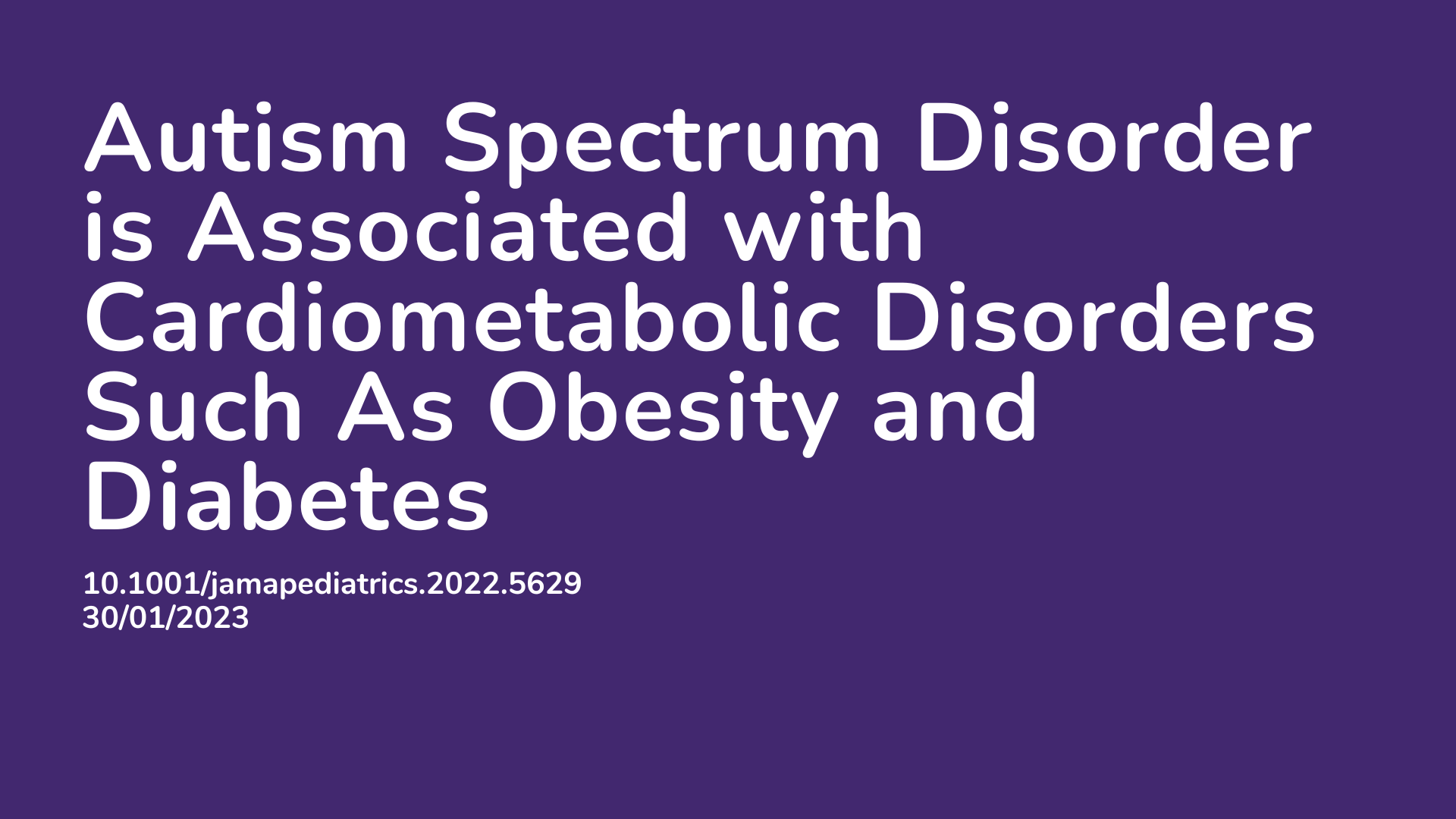Summary:
Research has clearly noted that individuals with autism spectrum disorder (ASD) have an increased chance of obesity, however whether ASD is associated with other cardiometabolic disorders is currently unclear. The authors have conducted a systematic review and meta-analysis of the current evidence surrounding ASD and cardiometabolic diseases from 2009 to 2017. A total of 34 studies were included in the analysis, as well as over 200,000 participants with ASD and over 7,000 000 participants without ASD. The results have supported that children with ASD have an increased risk of obesity, but also an increased risk of type 1 and type 2 diabetes and high cholesterol. These results suggest that there is an increased risk of cardiometabolic diseases when ASD is apparent and that all clinicians should monitor individuals with ASD for any contributing factors and signs to ensure better health outcomes.
Abstract:
Importance: Although the increased risk of obesity among individuals with autism has been well established, evidence on the association between autism, cardiometabolic disorders, and obesity remains inconclusive. Objective: To examine the association between autism spectrum disorders and cardiometabolic diseases in a systematic review and meta-analysis. Data sources: PubMed, Scopus, Web of Science, ProQuest, Embase, and Ovid databases were searched from inception through July 31, 2022, without restrictions on date of publication or language. Study selection: Observational or baseline data of interventional studies reporting the prevalence of cardiometabolic risk factors (ie, diabetes, hypertension, dyslipidemia, atherosclerotic macrovascular disease) among children and/or adults with autism and matched with participants without autism were included. Data extraction and synthesis: Screening, data extraction, and quality assessment were performed independently by at least 2 researchers. DerSimonian-Laird random-effects meta-analyses were performed using the meta package in R. Main outcomes and measures: Relative risks (RRs) of diabetes, hypertension, dyslipidemia, and atherosclerotic macrovascular disease among individuals with autism were the primary outcomes. Secondary outcomes included the RR of type 1 and type 2 diabetes, heart disease, stroke, and peripheral vascular disease. Results: A total of 34 studies were evaluated and included 276 173 participants with autism and 7 733 306 participants without autism (mean [range] age, 31.2 [3.8-72.8] years; pooled proportion [range] of female individuals, 47% [0-66%]). Autism was associated with greater risks of developing diabetes overall (RR, 1.57; 95% CI, 1.23-2.01; 20 studies), type 1 diabetes (RR, 1.64; 95% CI, 1.06-2.54; 6 studies), and type 2 diabetes (RR, 2.47; 95% CI, 1.30-4.70; 3 studies). Autism was also associated with increased risks of dyslipidemia (RR, 1.69; 95% CI, 1.20-2.40; 7 studies) and heart disease (RR, 1.46; 95% CI, 1.42-1.50; 3 studies). Yet, there was no significantly associated increased risk of hypertension and stroke with autism (RR, 1.22; 95% CI, 0.98-1.52; 12 studies; and RR, 1.19; 95% CI, 0.63-2.24; 4 studies, respectively). Meta-regression analyses revealed that children with autism were at a greater associated risk of developing diabetes and hypertension compared with adults. High between-study heterogeneity was a concern for several meta-analyses. Conclusions and relevance: Results suggest that the associated increased risk of cardiometabolic diseases should prompt clinicians to vigilantly monitor individuals with autism for potential contributors, signs of cardiometabolic disease, and their complications.
Article Publication Date: 30/01/2023
DOI: 10.1001/jamapediatrics.2022.5629



